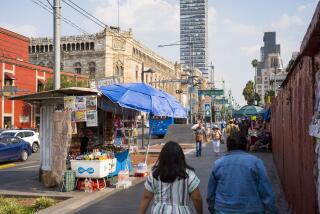With 2 new laws, Mexico City smokers feel put out
- Share via
MEXICO CITY — The news for smokers was bad. The question was how bad.
Smokers and restaurateurs and other business owners in Mexico City on Wednesday were debating the ramifications of not one but two groundbreaking laws seeking to curb smoking. Some were scratching their heads over which they would have to obey, and many others expressed skepticism that either would be effectively enforced.
“I’m sure that neither . . . is going to succeed,” said Andres Romero Olivares, a 47-year-old accountant, who saw the restrictions as the wrong solution to the nation’s health woes.
On Tuesday, the Mexican Senate passed nationwide restrictions on smoking in workplaces, restaurants, bars and other public enclosures, requiring stiff fines for violations and possible 36-hour jail stints for smokers who refuse to comply. That measure, already passed by Congress’ lower house, is expected to be signed into law by President Felipe Calderon.
The same day, Mexico City’s legislative assembly approved even tougher rules for the capital that would ban indoor smoking in public places. The law tightened restrictions passed last fall, which had allowed bars and restaurants to set aside sections for smokers.
Health advocates characterized the side-by-side votes as a sign of shifting attitudes about smoking in Mexico, where people routinely light up in crowded eateries and cigarettes are readily available to minors.
But the competing actions also left business owners and commentators wondering which of the laws would reign supreme in Mexico City, which is a federal district with its own government.
“At first they said we would have to make modifications for people who smoke,” restaurant owner Armando Rivera said. “But now it’s worse because they say it will be 100% smoke-free. But they also say that, no, because there’s a law in the Senate, smoking areas will be permitted.”
The national law, passed in the Senate 101 to 5, restricts smoking in public places such as offices, hospitals and buses, except in designated areas allowed for by the measure. It provides for fines of nearly $50,000 on establishments that don’t comply.
Under the measure, cigarette makers will have to place larger health warnings on packets. It also outlaws the sale of single cigarettes by street vendors -- a common practice here.
The local measure goes further than the national rules by requiring smoke-free workplaces, restaurants, bars and other indoor public places. Smoking will be allowed only on open-air terraces or in other outdoor areas.
“We hope that Mexico City, as one of the world’s largest cities, will serve as a catalyst for similar smoke-free action throughout Latin America and around the world,” said Matthew L. Myers, president of the Washington-based Campaign for Tobacco-Free Kids.
Myers said the Senate measure was a positive step, but didn’t go far enough in restricting tobacco use. He urged the federal government to adopt rules closer to those of Mexico City.
The municipal measure, backed by Mexico City’s left-leaning leadership, seeks to reduce smoking-related deaths in the capital, where air pollution is severe. Officials have said one-fifth of the city’s 9 million residents smoke and 150 people die of lung cancer each day.
But it remains to be seen how aggressively authorities will enforce the new restrictions. Few restaurants bothered to separate smokers from nonsmokers after the original Mexico City law took effect last month. Even in some that did, tight quarters left both groups enveloped in the same clouds.
“The police can’t be turned into restaurant hostesses to see who is smoking and who is not,” the Mexico City police chief, Joel Ortega, told reporters Tuesday after the measures were passed.
Some smokers lashed out at the restrictions, but brushed aside worries that they’ll have to stub out their cigarettes for good.
“In this country, all the laws get broken,” declared Carlos Suarez Aguilar, a 29-year-old computer engineer who said he could not imagine cigarette-free bars and discos. “Maybe they’ll pay attention in the first months, but after, everything will return to normal.”
--
More to Read
Sign up for Essential California
The most important California stories and recommendations in your inbox every morning.
You may occasionally receive promotional content from the Los Angeles Times.










